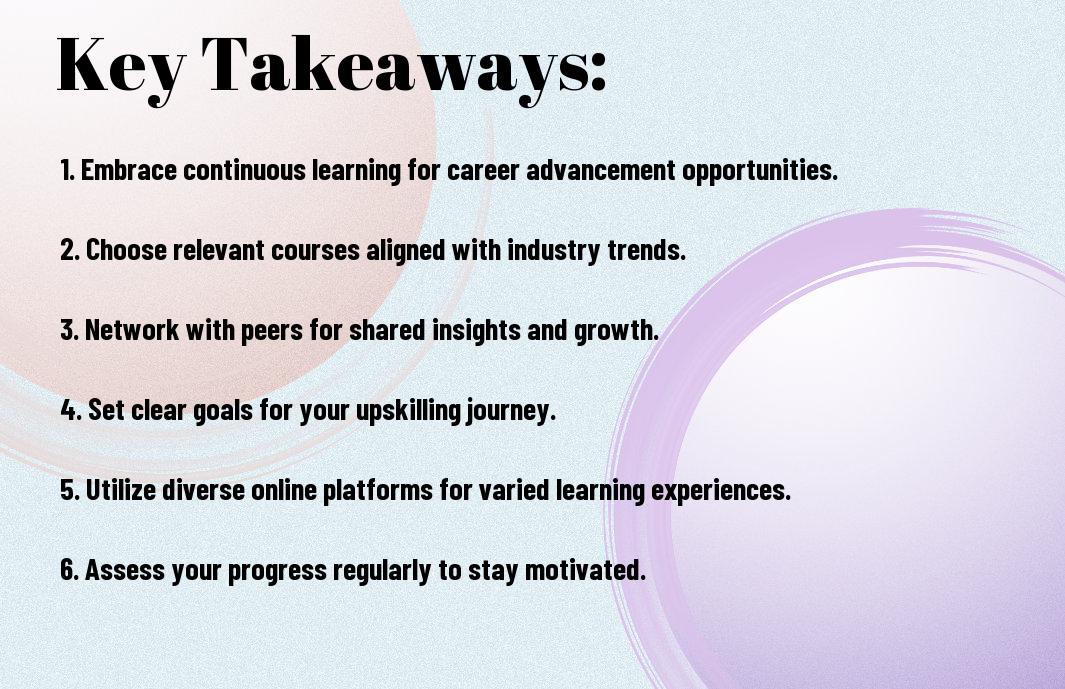You are constantly looking for ways to enhance your skills and stay competitive in the job market. Your career growth depends on your ability to adapt to new technologies and trends. By leveraging online upskilling, you can acquire new skills and knowledge at your own pace, giving you a significant edge over others. This approach allows you to take control of your professional development, ensuring you stay relevant and ahead in your field.
Key Takeaways:
To stay ahead in the competitive job market, continuous learning is necessary. Here are the key points to consider for online upskilling:
- Stay updated with industry trends by taking online courses and attending webinars to enhance your skills and knowledge in your field.
- Focus on developing in-demand skills such as digital marketing, data analysis, and cloud computing to increase your job prospects.
- Utilize online platforms such as MOOCs (Massive Open Online Courses) and online tutorials to access a wide range of courses and training programs.
- Set learning goals and create a personalized learning plan to help you stay focused and motivated throughout your upskilling journey.
- Leverage professional networks and online communities to connect with industry experts and like-minded individuals, and to stay informed about new opportunities and best practices.
Identifying Skills in Demand
For your career growth, it’s important to identify skills in demand. You can find valuable insights on How to Stay Ahead of the Curve to help you make informed decisions.
Emerging Trends
By exploring industry reports, you can discover emerging trends shaping your profession, enabling you to focus on acquiring relevant skills.
Market Analysis
By conducting thorough market analysis, you gain a deeper understanding of the job market and the skills required to stay competitive.
Identifying your target industry’s needs is vital for your career development. You should analyze job postings, industry reports, and market research to determine the skills in high demand, allowing you to tailor your upskilling efforts accordingly and increase your chances of success in your chosen field.

Choosing the Right Online Platform
The selection of an online platform is a significant step in your upskilling journey. You need to consider various factors to ensure that the platform you choose aligns with your goals and learning style.
Overview of Popular Platforms
For instance, platforms like Coursera, Udemy, and LinkedIn Learning offer a wide range of courses and specializations. You can explore these options to find the one that suits your needs.
Key Features to Consider
Overview of the key features is necessary to make an informed decision. You should look for features such as:
- Course variety and relevance
- Flexible learning schedules
- Interactive learning tools
- Certification and accreditation
Thou should prioritize the features that matter most to your learning goals and objectives.
Further evaluation of the key features is crucial to ensure that you get the most out of your online learning experience. You should consider features such as:
- Personalized learning paths
- Real-time feedback and assessment
- Collaboration and discussion forums
- Lifetime access to course materials
Thou should take the time to explore and evaluate these features to find the platform that best supports your upskilling journey.
Creating a Personalized Learning Plan
After identifying your learning needs, you can create a personalized learning plan. To get started, you can check out Top 5 Ways to Upskill to Stay Ahead in the Game to understand the importance of upskilling in today’s competitive job market.
Assessing Current Skills
Along with understanding industry trends, you need to assess your current skills to identify areas for improvement. This will help you create a focused learning plan that addresses your knowledge gaps.
Setting Realistic Goals
Above all, setting realistic goals is vital to achieving success in your upskilling journey. You should define what you want to achieve and set specific, measurable objectives.
Due to the ever-changing job market, you will need to regularly update your skills to stay relevant. As you work towards your goals, you will be able to track your progress and make adjustments to your learning plan as needed, ensuring that you stay on track and achieve your desired outcomes.
Effective Learning Strategies
Many online learners struggle to stay on track, but with the right approach, you can achieve your goals. You need to develop strategies that work for you, such as setting schedules and tracking progress.
Active Learning Techniques
To maximize your learning, you should engage with the material, ask questions, and participate in discussions, allowing you to retain information better and stay focused on your objectives.
Staying Motivated
AFTER you’ve started your online course, maintaining motivation is key, and you can do this by setting achievable milestones and rewarding yourself for your progress, helping you stay driven and committed to your goals.
With your motivation intact, you’ll be able to overcome obstacles and stay engaged in your learning journey, and as you progress, you’ll find that your confidence and skills will grow, enabling you to take on new challenges and pursue your career aspirations with renewed enthusiasm and purpose, helping you to stay ahead in your field.
Overcoming Common Challenges
Unlike traditional learning, online upskilling requires discipline and self-motivation to overcome common challenges, and you will need to develop strategies to stay on track and achieve your goals.
Managing Time Effectively
Above all, you must prioritize your time and create a schedule that allows you to balance your online learning with other responsibilities, ensuring you make the most of your time.
Dealing with Distractions
Between your work, family, and social life, distractions can be a significant obstacle to your online learning, and you need to find ways to minimize them and stay focused on your goals.
To minimize distractions, you can start by identifying the most common distractions, such as social media or email notifications, and finding ways to eliminate them while you study, allowing you to concentrate on your learning and make progress towards your goals, and you will be able to stay motivated and engaged in your online upskilling journey.

Measuring Progress and Success
Your ability to measure progress and success is vital in online upskilling, as it helps you identify areas of improvement and track your growth over time.
Tracking Progress
On a regular basis, you should assess your performance and adjust your learning strategy to achieve your goals, ensuring you stay on track and motivated throughout your upskilling journey.
Evaluating Outcomes
An crucial aspect of measuring success is evaluating the outcomes of your upskilling efforts, which involves assessing the skills and knowledge you have acquired and how they align with your career objectives.
Considering the outcomes of your upskilling efforts, you will be able to determine the effectiveness of your learning strategy and make informed decisions about future investments in your professional development, enabling you to maximize your return on investment and achieve your long-term career goals.
Summing up
Drawing together the points, you now have a clear understanding of how to stay ahead with online upskilling. As you continue on your journey, you can stay competitive by exploring Reskilling and Upskilling: The Key to Staying Competitive, which will help you make informed decisions about your professional development and enhance your skills to achieve your goals. You will be well-equipped to navigate the ever-changing job market with your newfound knowledge and skills.
FAQ
Q: What are the benefits of online upskilling, and how can it help me stay ahead in my career?
A: Online upskilling offers numerous benefits, including increased flexibility, accessibility, and affordability. By leveraging online courses and training programs, you can acquire new skills and knowledge in a self-paced and convenient manner, allowing you to enhance your career prospects and stay competitive in the job market. With online upskilling, you can fill gaps in your skillset, explore new areas of interest, and demonstrate your commitment to continuous learning and professional development, ultimately leading to greater career advancement opportunities and improved job satisfaction.
Q: How can I choose the right online upskilling platform and courses that align with my career goals and interests?
A: To choose the right online upskilling platform and courses, start by identifying your career objectives and the skills you need to acquire. Research various online learning platforms, such as Coursera, Udemy, and LinkedIn Learning, and explore their course offerings, reviews, and ratings. Consider factors like course format, duration, and level of difficulty, as well as the credibility and expertise of the instructors. You can also seek recommendations from colleagues, mentors, or industry professionals and read reviews from other learners to ensure that the platform and courses you choose are reliable, engaging, and relevant to your career aspirations.
Q: How can I balance online upskilling with my existing work and personal commitments, and ensure that I stay motivated and engaged throughout the learning process?
A: To balance online upskilling with your existing work and personal commitments, create a schedule that allows you to dedicate a specific time slot each day or week to learning. Set realistic goals and deadlines, and break down larger courses into smaller, manageable chunks. Establish a dedicated learning space, free from distractions, and use tools like calendars, reminders, and to-do lists to stay organized and on track. Additionally, connect with fellow learners or join online communities to build a support network, share knowledge, and stay motivated. By celebrating your progress, rewarding yourself for milestones achieved, and applying your new skills and knowledge in practical contexts, you can maintain your enthusiasm and commitment to online upskilling, even in the face of competing demands and responsibilities.
